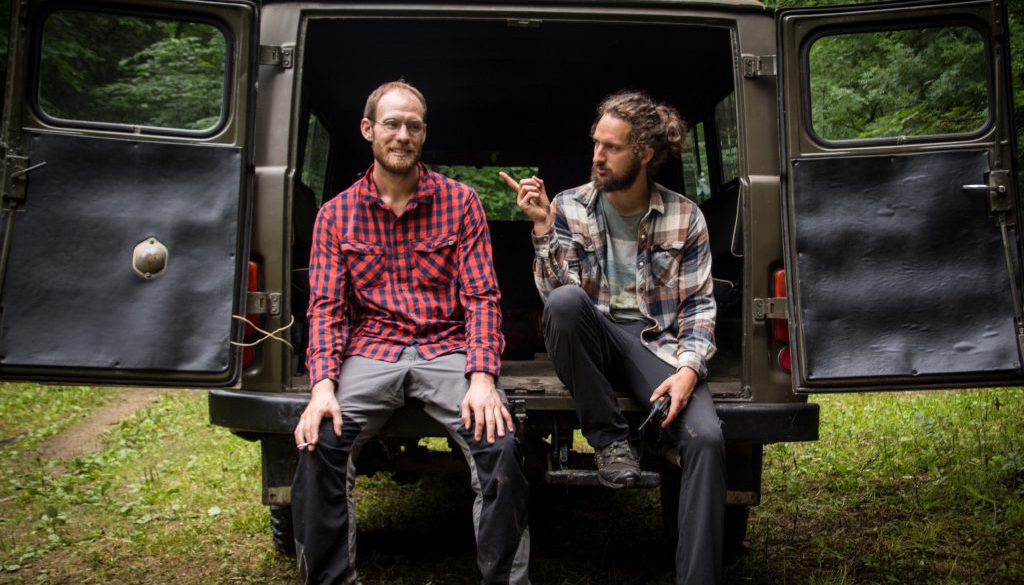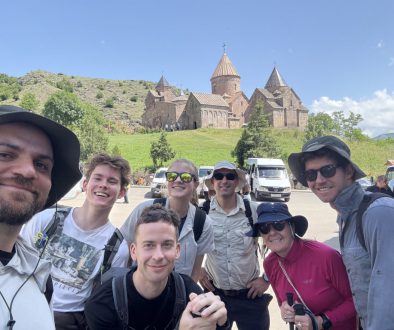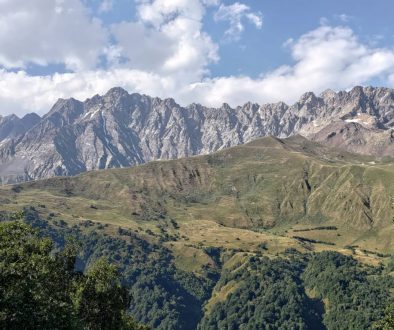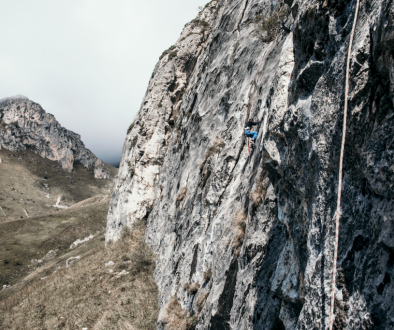Volunteer Story: Simon, the Philosopher from Sheffield, England
This is the 3rd installment in a series of Q&As with past TCT volunteers. The aim of this series is twofold: to provide information about what it is like to volunteer with us, and to preserve our antics for posterity.

Age: 30
From: Sheffield, UK
Occupation: just finished his PhD in philosophy, and is awaiting the final judgment/viva!
Plays: drum in punk bands – including a brief stint as the drummer for Yerevan’s own psychedelic freak-out group, LSD.
Project volunteered for: Dilijan Armenia trailbuilding camp 2017
TCT: This is a grassroots project with a marketing budget of precisely zero. Given that, how did you first hear about the Transcaucasian Trail?
Simon: I’ve spent a lot of time in Armenia, and I’ve spent a lot of time trying to negotiate the beautiful yet decidedly inaccessible mountains it contains. I think as soon as the call for volunteers went up, I was pretty well bombarded with facebook messages from friends I met in Armenia telling me that I must do it!
TCT: It’s quite a commitment to travel to a brand new part of the world to contribute your time and energy to something completely new! What motivated you to join the project as a volunteer?
Simon: As I hinted at above, I have spent a lot of time in Armenia: I worked for an NGO in Yerevan for two years. And during that period, I became a card-carrying Armeno-phile (if such a thing exists!). So, I didn’t need much encouragement to join the project as a volunteer. But perhaps I can be more concrete.
The inaccessibility of the Armenian mountains is such that me and a travel companion took to hitch-hiking along the highway going south; we would ask to be dropped off as soon as we saw a promising vista for exploration. On one such outing we got terribly, hopelessly lost, knowing only that we were perilously close to the border with Nakhichevan, an exclave of Azerbaijan – with whom Armenia is locked in a seemingly interminable frozen conflict. Trudging aimlessly through the snow, my friend noticed that we were inadvertently following some tracks. But tracks of what? A fox? A wolf? A…bear?
Our nervous speculations about what monster lurked around the next bend were stilled only when we saw in the distance a man: Finally! Some help! However, our elation was short lived. As we got closer, it emerged that the man was carrying a gun – and a big one at that, on a militarized border! It was too late now: He had seen us; there was no escaping.
Thankfully, our approach was met with a smile. He was no soldier, but a shepherd. After explaining our plight, and a few reckless rounds of target practice, he took us to his village where we were served mountain tea, homemade jam and were introduced to what seemed like every inhabitant of the village. Sipping the tea, I reflected: There has got to be a better way!
TCT: Many people would think twice about signing up for two weeks of hard labour in the mountains and sleeping rough! What were you hoping to gain from the experience?
Simon: In all honesty, and despite the ample warnings provided as part of the volunteer application process, I really didn’t know what I’d let myself in for when I signed up. I imagined myself skipping through a sun-dappled forest, stopping occasionally to paint red and white way-markings on stones and trees. And I think that what I initially hoped to gain from the experience was a couple of nice weeks wandering in the hills around Dilijan, disconnected from ‘The Cloud.’ However, the epithet hard labour much better describes what I met when work started. It took a day or two to readjust: This was definitely not a holiday. But when I had readjusted, what I gained from the experience was something completely unforeseen. And, to my mind, being confronted with an unforeseen challenge in this way greatly outstripped and exceeded any hopes I may have previously harbored.

TCT: Had you ever volunteered or worked on anything similar to this before? How did your time with us compare to your expectations or previous experiences?
Simon: I have done a lot of volunteering before, including volunteering in Armenia. But I never volunteered for a project similar to this one.
Here I must, unapologetically, sing the praises of the project. I have previously volunteered in Armenian as part of [another] program, and I have met many other volunteers involved in the same program. For all the opportunity that it offers, the [aforementioned] program in Armenia is blighted by an endemic of poorly organized volunteer projects: Oftentimes, the volunteers find themselves completely at sea, with nothing to do and nothing to work towards. Some give up and go home, others (like me) waste our time getting lost in mountains.
By contrast, the volunteering I experienced here with the Transcaucasian Trail was exceptionally well organized: We were well trained, we had purpose, and our efforts we constantly being reinforced by the sheer enthusiasm of the team leaders. I came away from my volunteering experience not only believing in the project, but feeling in a way committed to its success – to such an extent that I will feel that I have shirked some deep responsibility by not returning next summer!
TCT: What were the best and worst aspects of being part of the volunteer trail building crew in Dilijan?
Simon: Worst first. It has to be the mosquitoes. Not only did they blight you every time you downed tools to enjoy a nice roll of Lavash and Lori cheese, but for some – possibly mystical – reason my tent acted as a conductor, attracting all manner of fly, midge, gnat and mosquito from far and wide to converge. One volunteer counted 75 mosquito bites on her left calf alone. But, actually, now that I think of it, I want to give special mention to the incredibly salty white cheese: Sure, it is delectable in small cubes, perhaps picked at with a cocktail stick and accompanied with olives. But when served up daily in brick-sized hunks, it does begin to look less like sustenance and more like a challenge.
As for the best aspects, they are hard to pin down. The satisfaction of a clean axe-cut through a protruding root is one. Surveying the day’s work and the distance gained on the walk back to camp is another. Huddling around the campfire at night, talking nonsense, sheltered by the luminescence of the heavenly vault and the blank silence of the forest is yet another. Overall, I guess the best aspects coalesce around a way of interacting with the land that millennials like me thought could only be glimpsed at in Werner Herzog documentaries and lush National Geographic interest pieces.
TCT: Trail work is a largely thankless task, which, if done properly, will never be noticed by the people who benefit from it! Where, if anywhere, did your sense of reward come from?
Simon: Perhaps strangely, I don’t think I got a sense of reward from this work. Not that that is a bad thing; quite the opposite. The sheer foolishness of idiotically chugging away on a mountainside, thousands of miles from home provided a reprieve from my otherwise doggedly goal-oriented life in my relentlessly reward-focused society. From my perspective as a volunteer, my work was utterly meaningless – and therein lies its beauty! Of course, more generally, like everyone, I hope that I will be forever immortalized in folk tales and publicly commissioned statues, and I trust that the TCT team are hard at work preserving an account of my exploits for posterity…
TCT: The biggest trail building operation ever launched in Armenia was accomplished entirely by the labour of volunteers such as yourself. How does that make you feel?
Simon: Conflicted. On the one hand, it fills me with pride and arouses some long-dormant hope about the possibility of utopia and the insurmountable power and fundamental goodness of human fellowship. But, on the other hand, I wonder: Where is the Government? Isn’t this precisely the kind of project they should be investing in, not least given their oft-touted commitment to developing tourism in Armenia?
TCT: We’re assuming that if you’re willing to be interviewed, you mostly enjoyed your time with us! Who would you recommend our volunteer programme to?
Simon: If I were being ruthlessly pragmatic, Herculean types who can dig for 10 hours without breaking a sweat. If I were being moralistic, trekkers who have enjoyed nicely hewn trails and, thus, ought to give something back. If I were being honest, anyone who is reasonably fit, enjoys the outdoors and, perhaps, has an interest in Armenia.
TCT: How did you use your time off?
Simon: This I can’t stress enough: When the volunteer crew returned to TCT HQ after a week at camp we were treated like royalty! We were continually plied with ever-more delicious treats and sundries. And, for better or worse, we were inducted into the soon to be infamous TCT HQ parlour game: Ball-bag ball, which is like a perverse mixture of croquet and Carry On-esque innuendo. We also went to a nice secluded beach on the shores of lake Sevan, where we honed our slacklining skills. One Estonian girl swam real far into the lake and an Armenian man zoomed out to her on a water-mobile type thing and told her off. Apart from that, I was mostly lying down in various parts of the TCT HQ. On camp, we made a makeshift volleyball net and after work we managed to summon some unknown reserves of energy to play some vigorous rounds of volleyball.

TCT: Do you have a story you’d like to share that didn’t make it into any of your other answers?
Simon: On the weekend off, I went into Dilijan to try and find some more mosquito repellent. I asked the shopkeeper in the general store next to the bus station, but she didn’t have any answers. However, a fellow customer overheard and said he could give me a ride to the pharmacy. I took up his offer, and he drove me for ages through ever-more dilapidated waste-lands. Just when I was being abducted to some God-forsaken Armenian hinterland, a pharmacy emerged out of nowhere. I went in but I got my words confused and asked for syringes instead of spray. I tried to correct myself using suggestive gesticulations, but was met with blank stares. When I left the shop empty handed, and saw my kindly chauffeur giving me an expectant thumbs-up, all I could do was to pretend that I had found my quarry and was good to go. The moral of the story: Take more mosquito spray then you think you’ll need!

Have you considered volunteering on a project like this? Applications are now open for trailbuilding camps in Georgia and Armenia in summer 2019! Click here for full details of the programme and to register your interest.







February 26, 2018 @ 11:44 pm
These volunteer stories are great! Totally loving it. The photos on this one are ok too 😉